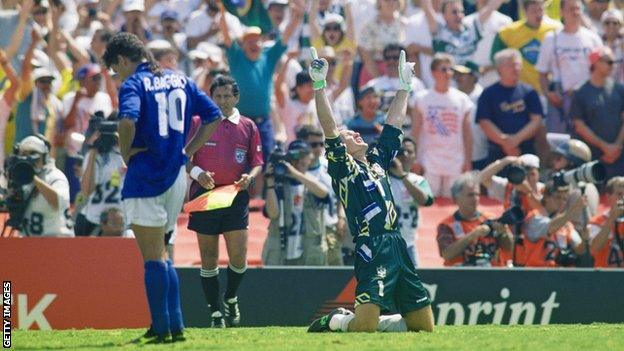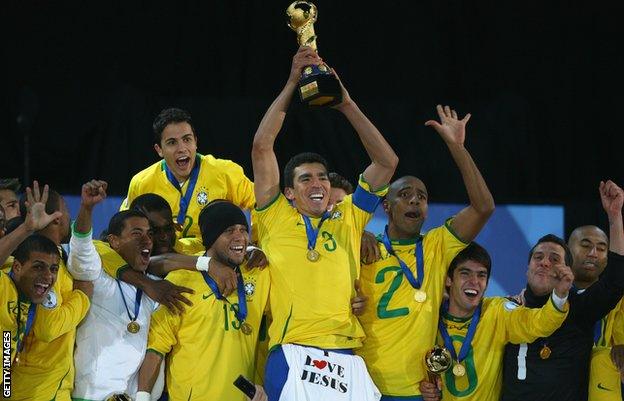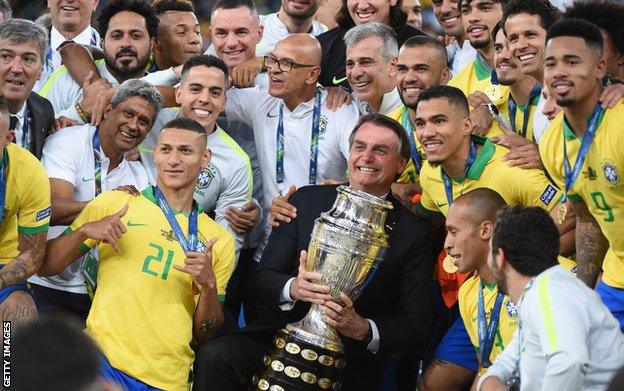Evangelicalism & Brazil: The religious movement that spread through a national team
- Published


Taffarel celebrates winning the World Cup of 1994 as Roberto Baggio stands, dejected
It was derby day in Belo Horizonte, but that wouldn't change anything. Joao Leite believed he had a mission assigned to him by Jesus Christ: to spread God's word among other football players.
So that afternoon in December 1982, just like he'd done for every match for the past three years, the Atletico Mineiro goalkeeper randomly approached an opponent before the big game started.
"Jesus loves you and I have a gift for you," he told Cruzeiro keeper Carlos Gomes as he presented him with a copy of the Bible.
At the time, Gomes found it all a little strange given the circumstances. He even admitted to feeling in some way angry as he was handed the book.
But that initial feeling later changed and he did actually join Leite's religious movement - Athletes of Christ. He was far from the only convert.
An association of evangelical Christian sportspeople, Athletes of Christ counted some of the most influential people in Brazilian football among its membership.
At their first meeting they were four in number. That would grow to about 7,000 across 60 countries, including high-profile footballers such as 2007 Ballon d'Or winner Kaka and ex-Bayern Munich centre-back Lucio.
"It all began with Alex Dias Ribeiro, a Formula 1 driver who competed with 'Jesus Saves' slogans on his cars," Leite, who played five times for Brazil, tells BBC Sport.
"I decided to do the same and played with 'Christ Saves' on my shirt, but then the Brazilian Football Association banned it and threatened my team Atletico with a points deduction.
"It was then that I started to give Bibles to other players. But they were difficult times - there was so much prejudice against evangelical players. Not even the national team felt like a comfortable environment. It was not easy for me."
In 1980, around when Leite set out on his "mission", 88.9% of Brazil's population identified as Catholics. Evangelicalism - a movement within Protestant Christianity - accounted for 6.6%.
The balance has since changed considerably. Research from Datafolha, a polling institute, put those respective figures at 50% and 31% in 2021.
Brazil remains the world's largest Catholic nation, but by 2032 it's predicted evangelical churches will be drawing more worshipers in the country.
From 2018: Evangelical Brazilians to make or break presidential election
When Leite retired from football in 1992, the Athletes of Christ movement was going from strength to strength.
The association had its own TV show in Argentina, presented by ex-Brazil midfielder Paulo Silas and aired three times a week. They even tried, in vain, to convert Diego Maradona.
One of their most prominent figures, Brazil right-back Jorginho, also handed out Bibles to opponents when captaining his club side Bayer Leverkusen, whom he left for Bayern Munich in 1992.
Two years later during the 1994 World Cup, he was one of six evangelical footballers in the Brazil team that beat Italy in a shoot-out to win the final. Five of them formed a circle in the centre of the pitch and thanked God after Roberto Baggio's penalty flew over the bar. The sixth member was celebrating in his six-yard box.
"When Baggio picked up the ball I had no doubt we would win," goalkeeper Taffarel said afterwards. "Anyone who believes in God will never lose to someone who believes in Buddha."
The image of Taffarel, now a Liverpool goalkeeping coach, celebrating with his arms raised to the heavens in front of a dejected Baggio, a practitioner of Nichiren Buddhism, served as the cover of the book 'Quem Venceu o Tetra?' (Who won the fourth title?).
It included testimony from the players giving credit to God for the victory, which was criticised by legendary coach Mario Zagallo. It marked a turning point.

Lucio lifts the 2009 Confederations Cup, with an 'I Love Jesus' T-Shirt draped over his shorts
The Athletes of Christ movement no longer enjoys the popularity it once had. But evangelicalism continues to spread rapidly within Brazil and its influence within the national team has only increased since 1994.
Whereas Leite encountered some hostility towards his faith within the national set-up in the 1980s, nowadays evangelical pastors are granted special access to team camps. They rely on donations from players to travel and hold services in separate rooms designated by the Brazilian FA. In some cases, pastors have even become part of players' entourages.
During the 2002 World Cup - which Brazil also won - defender Lucio, Kaka and ex-Barcelona defender Edmilson would join in prayer.
"You could do whatever you wanted on your days off," Lucio told the magazine Revista Trip, external in 2010. "For me, those were moments of faith.
"We tried to discuss positive ideas on how to handle the enormous pressure we had to face in those games."
After winning the 2009 Confederations Cup in South Africa, Lucio and other players wore white shirts with devout slogans such as 'I love God' and 'I belong to Jesus'.
Officials told them to remove them, but Lucio resisted and draped his around his shorts as he raised the trophy. The Danish FA publicly complained about the image and a warning letter was sent to Brazil by Fifa, whose rules ban "political, religious or personal statements".
The following year, voices from within Brazil started to question whether evangelicalism had too much influence on the national set-up.
Amid growing pressure for Ronaldinho, then playing for AC Milan, to be called up for the 2010 World Cup, ESPN magazine wrote on its cover page that he wouldn't go because "to play for the Selecao, football is not enough. You have to be a member of the 'igrejinha' (literally 'little church', also meaning 'clique' or 'closed shop')".
Ultimately, Ronaldinho wasn't included in the squad and after Brazil were knocked out by the Netherlands in the quarter-finals there were claims that a long-serving performance analyst had been replaced with somebody who had "more evangelical experience".
A few years later in 2015, the chief of security was fired by the Brazilian FA for allowing an evangelical service to take place inside the team's hotel without coach Dunga's knowledge.
"Today heaven was celebrating during our meeting because three lives accepted Jesus Christ and made the right decision," the pastor posted on social media. Liverpool duo Alisson Becker and Fabinho, former Chelsea and Arsenal defender David Luiz and Tottenham's Lucas Moura were among those present.

Bolsonaro poses with the Copa America trophy after Brazil's victory over Peru in the 2019 final
It's not only in football that evangelicals have grown in number and power in Brazil. It's also in politics.
Far-right president Jair Bolsonaro won the 2018 elections with the support of almost 70% of the evangelical community, including football stars like Neymar and Rivaldo.
Bolsonaro, who was born into a Catholic family and later re-baptised in the Jordan river by an evangelical pastor, promised to appoint a Supreme Court judge who was "terribly evangelical". And he has delivered.
When in December 2021 Andre Mendonca, an attorney and evangelical pastor, was confirmed for the role, a video of first lady Michele Bolsonaro shouting 'Glory to God' and speaking in tongues went viral.
While acting as attorney general, Mendonca had used verses from the Bible to defend the reopening of churches during the Covid-19 pandemic. He said his appointment was, "one small step for man, one giant step for evangelicals".
The evangelical expansion in politics can be traced back to 1986, when a rumour that Brazil was considering making Catholicism its only official religion started to spread. That year, 32 evangelical federal deputies were elected. Now there are 105 such deputies, as well as 15 senators.
It's not unusual to find some of them holding services at the Chamber of Deputies. When former leader Dilma Rousseff was impeached in 2016, 58 legislators dedicated their vote to God.
Critics link evangelicalism in politics with a strengthening of the conservative agenda and a rise in intolerance that does not leave room for those of other religious beliefs, especially those of African origin, to express themselves.
While Bolsonaro's national approval rating recently dropped to 22%, with the next presidential elections set for 2 October, many evangelical footballers like Neymar remain loyal and are seen as playing a key role in boosting his appeal.
Former Brazil international Walter Casagrande, now a pundit, has criticised the Paris St-Germain forward, claiming he's become Bolsonaro's "vassal".
So when Bayer Leverkusen striker Paulinho scored for Brazil in a 4-2 win over Germany at last year's Olympic Games, it was interesting to note his celebration.
Taking a stand against religious persecution, the 21-year-old made the gesture of an archer in homage to Oxossi, his orixa (a spirit deity) in the Candomble religion.
A mixture of traditional Yoruba, Fon and Bantu beliefs originating from different regions in Africa, Candomble has long been practised in Brazil, in the past often in secret. Even now it still comes under occasional attack from radical evangelicals, who regard the religion to be satanic.
But Paulinho seemed determined to remind others back home that there is still room for all religions in Brazil - and in the national team.